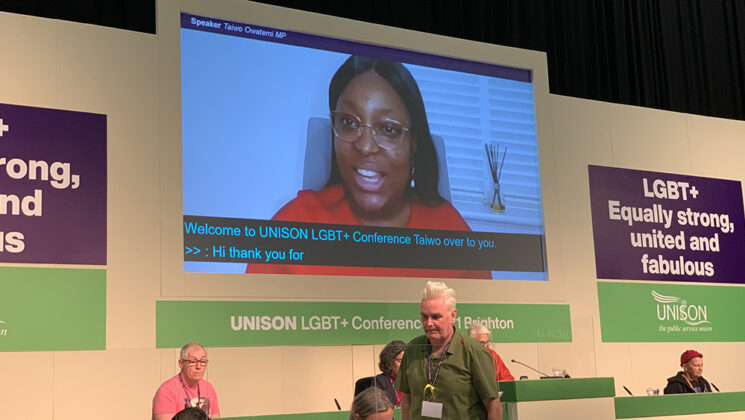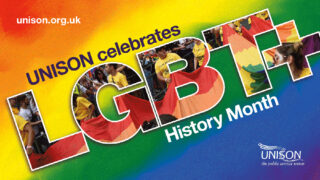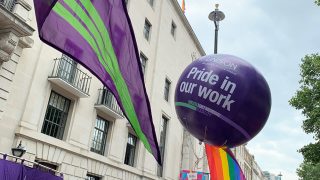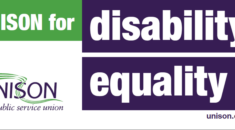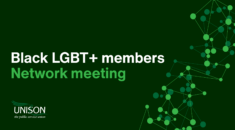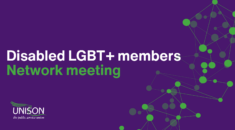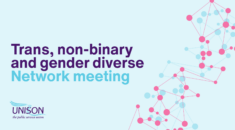Taiwo Owatemi MP, the shadow minister for women and equalities, and herself a UNISON member, spoke to the union’s LGBT+ conference virtually this afternoon (pictured), taking the opportunity to announce that a future Labour government would equalise hate-crime legislation to ensure that all such crimes see sentencing affected by the motive.
The trained pharmacist whose worked in the NHS, thanked UNISON members for all they’ve done during the pandemic.
And she looked back at the important role played by trade unions organising for LGBT+ equality. However, she stressed that there is still inequality.
For example, Ms Owatemi cited research has shown that it is more difficult for LGBT+ people to take time off work for family-related issues, while public services that are ‘lifelines’ to LGBT+ – such as advice lines, HIV/Aids testing, LGBT+ youth workers and more – are being cut by the government.
In a Q&A session, she also reiterated her faith in the parliamentary system, noting that the faults of the present government do not mean that it is an inherently bad system.
In debates today, Neil Adams, speaking on behalf of the disabled caucus, introduced a motion stressing that working from home can be a reasonable adjustment.
Graeme Ellis from the national disabled members’ committee noted: “It is important that the right to work from home is properly funded.” And he highlighted how general secretary Christina McAnea had helped to pressure government to make progress on this.
A further speaker raised the difficulties of hybrid working, in terms of reasonable adjustments being needed in both places of work, home and the office (or other workplace).
Ben King from the East Midlands stressed the importance of accessing the advice and toolkit that UNISON has produced on all this.On mental health, Claire Best for the North West said that, when lockdown came, nobody really knew what it would be like. While some people live alone and were already isolated, COVID-19 exacerbated this for some LGBT+ people.
Ann Marie Sutton, also from the North West, noted that LGBT+ people are disproportionately affected by mental ill health, and reports of mental ill health in the LGBT+ community have “almost doubled” in the pandemic.
She stressed the importance of signposting people to services that can help.
Citing deja vu, Penny Smith for the bi+ caucus said that, when she attended her first LGBT+ conference, years earlier, in Blackpool, bi members were feeling unrecognised and misunderstood. Addressing a motion on Bi+ inclusion – stronger together, she said that it was unfortunately true that this was still often the case.
And trying to explain bisexuality simply, she said that it was rather like mushrooms: you can like the button ones, the brown ones and the white ones, the huge ones … and to much laughter appealed for mushroom recipes.
Jenn, from the West Midlands, said that they could: “Attest to the prevalence of biphobia”, while Thomas Rust from Yorkshire and Humberside, ‘echoing and thanking previous speakers,” noted that a Stonewall bisexuality report had revealed that substantial numbers of bisexual people have never accessed LGBT+ resources, have decided not to reported a hate crime against them or are even out to their doctor.
With the Westminster government’s consultation on banning so-called ‘conversion therapy’ in England now open, Kimberley Hughes from Scotland talked of “the fear of coming out for the first time.
“Unfortunately, not everyone is accepted”. ‘Conversion therapy’ is a pseudo treatment based on the assumption that being lesbian, gay, bi or trans is a mental illness that can be cured.
It is unethical and harmful, and the government’s attempt to pretend that (if over 18) you can consent to something that is unethical and harmful, is dangerous.
“Can you imagine being told that everything you are is unacceptable?” she asked.
“We must bring an end to conversion therapy. Full stop.”
Pauline Bacon from Suffolk, describing herself as “a person of faith,” said that it was important for older people within religious environments to “understand what harm it’s [conversion therapy] done in the past.”
Adam from the North West moved a motion on Freedom of information requests, which have increased in recent years as certain groups have sought to question inclusive policies in public services.
In the case of his branch, he provided conference with an hilarious run down of the breaches the branch had made to “flag etiquette” when the rainbow flag was first raised with his police employer’s support.
Lucy Power went one further, regaling conference with how her police employer had had two police cars painted with the rainbow flag, only to be inundated with freedom of information (FOI) requests to know: “How much did your gay cars cost?”
Aside from pointing out that cars don’t have a sexuality, she made the serious point that such FOI are increasing and are essentially part of an ongoing homophobic and transphobic campaign.
“We need to make a stand,” she concluded.

